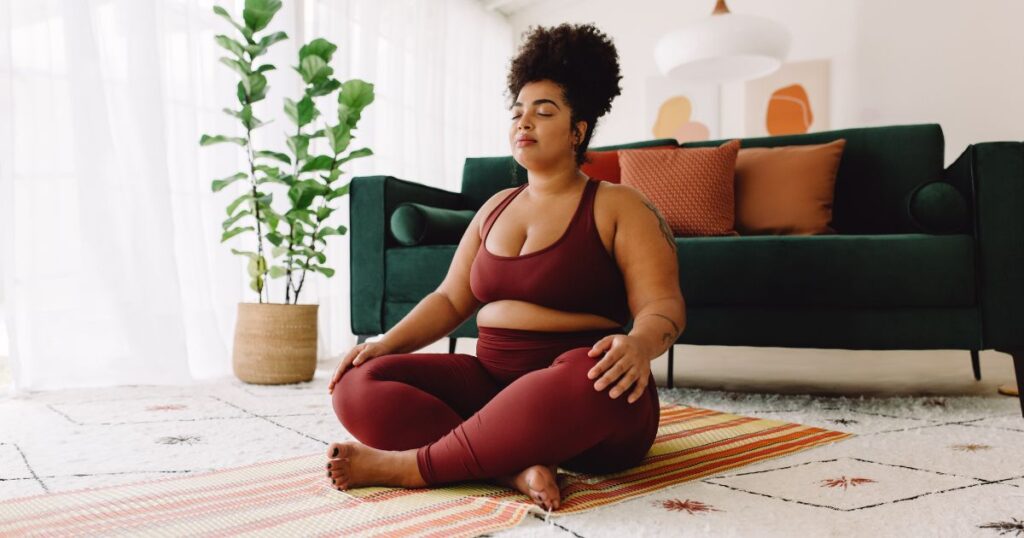Are you dealing with a bloated stomach? An intuitive eating dietitian weighs in on what could be going on and how to find relief.
“I’m so bloated”
How many times have you heard or said the above statement? I’m going to guess a countless number of times.
Bloating seems to be a frequent topic of conversation. It is also an issue that many seek help from nutrition and medical professionals.
Even on social media, there are millions of videos on how to “beat the bloat,” as if bloating is a phenomenon to be avoided at all costs. There does, however, seem to be a lack of public understanding of what bloating actually is and what it means.
Keep reading to learn more about what a bloated stomach looks like, what the cause may be, and how you can find relief using a non-diet approach.
If you haven’t already, make sure to check out my entire post on how to improve gut health with intuitive eating next! It is filled with tons of tangible information on how to support your gut using a non-diet approach.
Bloated Stomach: What Bloating Looks Like
Bloating is a swelling of the abdomen and can result in feelings of tightness normally caused by your gastrointestinal tract being filled with air or gas.
Common symptoms include:
- Pain
- Belching
- Passing gas
- Abdominal gurgling
Overall there is a pronounced feeling of abdominal discomfort involved.
Bloating can have many different causes, but the most common causes are:
- Acid reflux
- Swallowing air
- Constipation
- Food intolerances
- Overeating
What Causes Bloating?
It is very likely you have experienced the above issue before and know all too well how uncomfortable and painful it can be. Now that we have defined what bloating is, it is important for us to define what it is not:
The normal, non-painful distention of your abdomen after a great meal or at the end of the day post food and fluids are not bloating. Food and liquids take up space outside of your body, they are going to take up space inside your body as well, and that naturally leads to a slight swelling or distention of your stomach that isn’t accompanied by pain or unusual amounts of gas.
When Should You Worry About Stomach Bloating?
This distinction between true bloating and natural distension throughout the day is important to highlight to bring awareness to what you may be experiencing day to day.
Natural distention throughout the day is a normal occurrence, and it does not mean anything about you needs to be fixed. Your body is functioning as it should, and what you have eaten or drank throughout the day normally results in nonpainful distention.
Pst… are you ready to ditch dieting for good? Make peace with food and learn how to nourish your body for life with our self-paced online course: The Nourished Body Basics Course!
Dietitian-Approved Bloating Relief Remedies

Now, what to actually do to find relief when you’re having true bloating:
- Recognize that there isn’t anything wrong with you or your body. You do not have to “beat the bloat” because you are not at war with your body or its functions.
- Take guilt out of the equation. As mentioned above, there is nothing wrong with you or your body. You do not have to take on guilt for being bloated. Bloating has a number of possible causes but sometimes it just happens, and it is difficult to pinpoint an exact reason.
- Try gentle stretching or yoga. Bloating is uncomfortable, and the gas pains that often come with it are no joke. A gentle stretching or yoga session can help release some of the tension in your abdomen and move gas through your system.
- Sip on herbal tea. Herbal teas like chamomile, peppermint, or ginger can help aid digestion and soothe the stomach. Staying hydrated is important, even when you are feeling uncomfortable fullness.
- Practice eating and drinking slowly. Bloating is often caused by excess air in your GI tract. Eating or drinking quickly can increase the likelihood of swallowing larger amounts of air during a meal.
- Notice food sensitivities. Listen. Food is your friend, not your enemy, but sometimes there are particular foods that may not sit well with you. And that is okay! You do not need an elimination diet in order to determine what these are, you can simply take note of the last foods you’ve eaten when bloating occurs. This may take some trial and error to determine what specific foods, spices, or ingredients are a trigger for bloating. However, understanding how certain things make your body feel can be empowering.
Bloated Stomach: The Takeaway
It is important to note that this is not an exhaustive list of remedies to combat bloating. Additionally, it is important to address root causes if bloating occurs frequently.
If you are experiencing bloating after most meals, it could be time to see a doctor to rule out more serious conditions.
If you or someone you know is looking to work with a registered dietitian to improve their relationship with food and body, check out our Intuitive Eating Program to work 1:1 with a Registered Dietitian.
Not quite ready to make the leap into 1:1 counseling? Take a look at our Nourished Body Basics Course for a complete rundown on getting started with healing your relationship with food and your body.
Written by Emily Adkisson, RDN

[…] Bloated Stomach: The Basics of Bloating […]